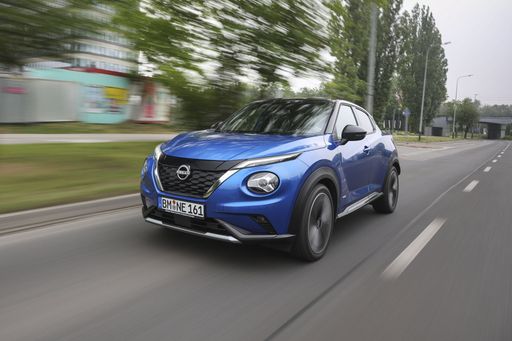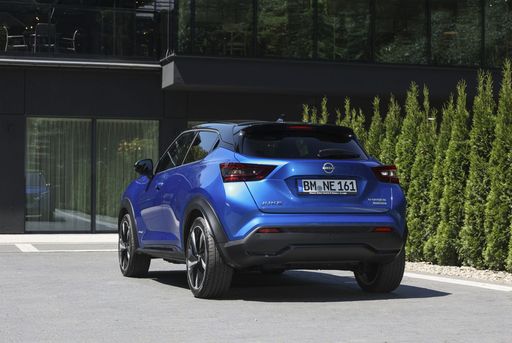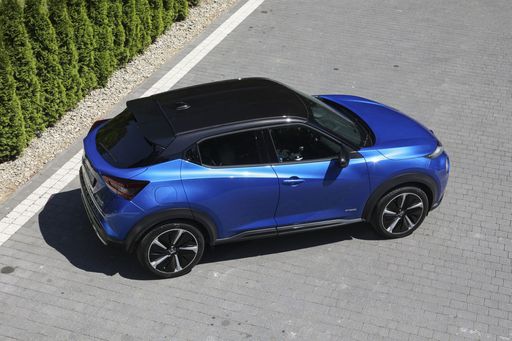Hyundai Tucson vs Nissan Juke - Differences and prices compared
Costs and Efficiency:
Price and efficiency are key factors when choosing a car – and this is often where the real differences emerge.
Nissan Juke has a decisively advantage in terms of price – it starts at 21400 £, while the Hyundai Tucson costs 30600 £. That’s a price difference of around 9249 £.
Fuel consumption also shows a difference: Hyundai Tucson manages with 1 L and is therefore clearly more efficient than the Nissan Juke with 4.70 L. The difference is about 3.70 L per 100 km.
Engine and Performance:
Power, torque and acceleration are the classic benchmarks for car enthusiasts – and here, some clear differences start to show.
When it comes to engine power, the Hyundai Tucson has a significantly edge – offering 252 HP compared to 143 HP. That’s roughly 109 HP more horsepower.
In acceleration from 0 to 100 km/h, the Hyundai Tucson is noticeable quicker – completing the sprint in 7.90 s, while the Nissan Juke takes 10.10 s. That’s about 2.20 s faster.
In terms of top speed, the Hyundai Tucson performs to a small extent better – reaching 204 km/h, while the Nissan Juke tops out at 180 km/h. The difference is around 24 km/h.
There’s also a difference in torque: Hyundai Tucson pulls clearly stronger with 379 Nm compared to 200 Nm. That’s about 179 Nm difference.
Space and Everyday Use:
Whether family car or daily driver – which one offers more room, flexibility and comfort?
Seats: offers more seating capacity – vs .
In curb weight, Nissan Juke is evident lighter – 1274 kg compared to 1542 kg. The difference is around 268 kg.
In terms of boot space, the Hyundai Tucson offers clearly perceptible more room – 620 L compared to 422 L. That’s a difference of about 198 L.
In maximum load capacity, the Hyundai Tucson performs evident better – up to 1799 L, which is about 494 L more than the Nissan Juke.
When it comes to payload, Hyundai Tucson evident takes the win – 545 kg compared to 427 kg. That’s a difference of about 118 kg.
Who wins the race?
The Hyundai Tucson proves to be is largely superior and therefore becomes our DriveDuel Champion!
Hyundai Tucson is the better all-rounder in this comparison.
 @ Hyundai Motor Company
@ Hyundai Motor Company
Hyundai Tucson
Costs and Consumption
View detailed analysis
Engine and Performance
View detailed analysis
Dimensions and Body
View detailed analysis
Hyundai Tucson
Hyundai Tucson marries bold, sculpted looks with a clever, roomy cabin that feels smarter than its price tag suggests. It's composed on the road, easy to live with day-to-day, and a sensible choice for buyers who want SUV style without the showroom theatrics.
details @ Hyundai Motor Company
@ Hyundai Motor Company
 @ Hyundai Motor Company
@ Hyundai Motor Company
 @ Hyundai Motor Company
@ Hyundai Motor Company
 @ Hyundai Motor Company
@ Hyundai Motor Company
 @ Hyundai Motor Company
@ Hyundai Motor Company
Nissan Juke
The Nissan Juke is a pocket-sized crossover that refuses to blend in, with quirky styling and a cheeky stance that turns heads at every traffic light. It’s ideal for shoppers who value personality and nimble urban driving over maximum practicality, delivering surprising pep and a well-equipped feel for everyday fun.
details @ Nissan Motor Corporation
@ Nissan Motor Corporation
 @ Nissan Motor Corporation
@ Nissan Motor Corporation
 @ Nissan Motor Corporation
@ Nissan Motor Corporation
 @ Nissan Motor Corporation
@ Nissan Motor Corporation
 @ Hyundai Motor Company
@ Hyundai Motor Company
|
 @ Nissan Motor Corporation
@ Nissan Motor Corporation
|
|
|
|
Costs and Consumption |
|
|---|---|
|
Price
30600 - 46300 £
|
Price
21400 - 30100 £
|
|
Consumption L/100km
1 - 7.6 L
|
Consumption L/100km
4.7 - 6 L
|
|
Consumption kWh/100km
-
|
Consumption kWh/100km
-
|
|
Electric Range
64 - 70 km
|
Electric Range
-
|
|
Battery Capacity
-
|
Battery Capacity
0.60 kWh
|
|
co2
22 - 172 g/km
|
co2
107 - 136 g/km
|
|
Fuel tank capacity
42 - 54 L
|
Fuel tank capacity
46 L
|
Dimensions and Body |
|
|---|---|
|
Body Type
SUV
|
Body Type
SUV
|
|
Seats
5
|
Seats
5
|
|
Doors
5
|
Doors
5
|
|
Curb weight
1542 - 1889 kg
|
Curb weight
1274 - 1405 kg
|
|
Trunk capacity
546 - 620 L
|
Trunk capacity
354 - 422 L
|
|
Length
4510 - 4535 mm
|
Length
4210 mm
|
|
Width
1865 mm
|
Width
1800 mm
|
|
Height
1650 mm
|
Height
1593 mm
|
|
Max trunk capacity
1721 - 1799 L
|
Max trunk capacity
1237 - 1305 L
|
|
Payload
523 - 545 kg
|
Payload
405 - 427 kg
|
Engine and Performance |
|
|---|---|
|
Engine Type
Diesel MHEV, Plugin Hybrid, Petrol, Full Hybrid
|
Engine Type
Petrol, Full Hybrid
|
|
Transmission
Automatic, Manuel
|
Transmission
Manuel, Automatic
|
|
Transmission Detail
Dual-Clutch Automatic, Automatic Gearbox, Manual Gearbox
|
Transmission Detail
Manual Gearbox, Dual-Clutch Automatic, Automatic Gearbox
|
|
Drive Type
Front-Wheel Drive, All-Wheel Drive
|
Drive Type
Front-Wheel Drive
|
|
Power HP
136 - 252 HP
|
Power HP
114 - 143 HP
|
|
Acceleration 0-100km/h
7.9 - 11.6 s
|
Acceleration 0-100km/h
10.1 - 11.8 s
|
|
Max Speed
180 - 204 km/h
|
Max Speed
166 - 180 km/h
|
|
Torque
250 - 379 Nm
|
Torque
200 Nm
|
|
Number of Cylinders
4
|
Number of Cylinders
3 - 4
|
|
Power kW
100 - 185 kW
|
Power kW
84 - 105 kW
|
|
Engine capacity
1598 cm3
|
Engine capacity
999 - 1598 cm3
|
General |
|
|---|---|
|
Model Year
2024 - 2025
|
Model Year
2024
|
|
CO2 Efficiency Class
E, B, F, D
|
CO2 Efficiency Class
D, E, C
|
|
Brand
Hyundai
|
Brand
Nissan
|
What drive types are available for the Hyundai Tucson?
Available configurations include Front-Wheel Drive or All-Wheel Drive.
The prices and data displayed are estimates based on German list prices and may vary by country. This information is not legally binding.
